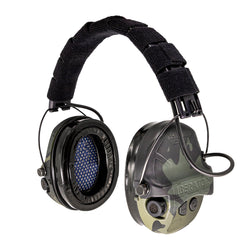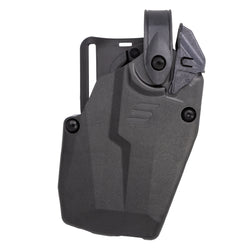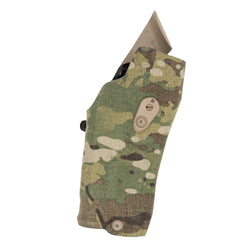The Safariland SAVES program isn’t just a list of names—it’s a testament to lives protected and second chances granted. Each member has a story, a moment when the right gear made all the difference. This series will introduce you to those stories.
Today’s SAVES is Garret Osilka, whose life was saved thanks to his Second Chance® Summit SM01 level IIIA and IMPAC HT plate. Here’s his story.
BACKGROUND: Garret Osilka’s Career in Law Enforcement
Garret worked for eight years at the Jacksonville Police Department in Florida, where he patrolled and was a member of the SWAT Team before moving to Loveland, Colorado, in 2012. There, he joined the Loveland Police Department as a patrol officer and SWAT team member. Two years later, he would experience the event that earned him his place in the SAVES Club.

THE Traffic Stop That Changed Everything
It was dusk on March 2, 2014, when Officer Garret Osilka was patrolling the streets of Loveland with a ride-along. At a red light, he noticed a Jeep Cherokee ahead of him with extremely dark window tint and no visible license plate. He called in the stop to dispatch and attempted a traffic stop.
Both vehicles passed through the intersection and pulled onto a road behind a grocery store. Garret stopped on the right side of the road, turning on his takedown lights and spotlight to illuminate the scene. Normally, officers approached vehicles from the passenger side, but because of the dark tint, Garret chose to approach from the driver’s side for better visibility
He approached the vehicle slowly, using his flashlight to attempt to see through the dirty tinted windows. All the windows were up except for the driver’s side. Even with the light, he couldn’t see inside. Pausing at the B pillar (the pillar behind the driver, between the front and rear seats), Garret noticed the driver was still facing forward.
Suddenly, Garret heard a loud bang and felt as though someone had punched him as hard as they could in the chest, high on his sternum. He knew immediately what had happened. Later, he would learn that the driver had rested a sawed-off shotgun loaded with #4 buckshot on his left shoulder, angled back toward Garret from just two to three feet away.
Disoriented, Garret turned away from the driver’s side and tried to process what had happened. He drew his Kimber pistol and looked back at the suspect vehicle. As the Jeep began to pull away, the light dusting of snow slowed its escape, causing it to slide into the curb. Garret returned fire with eight or nine rounds, but unfortunately, missed the suspect.
As the suspect fled, the ride-along got out to help Garret. He managed to call in the shooting to dispatch and describe the vehicle. With the suspect gone, his focus shifted to his injuries. Breathing grew more difficult as he felt the damage in his chest.
He didn’t clearly remember what he did next but soon found himself sitting on the ground, trying to gauge the extent of his wounds. Taking shallow breaths, he feared the hit above his heart would be fatal. Thinking it might be the end, his thoughts went to his family—and to the suspect. “F** this guy. No way this guy will take me away from my wife and kids.” He reminded himself to keep breathing; just keep taking those very shallow breaths.
The ambulance arrived quickly, and paramedics assisted in removing his uniform shirt and vest. It was then that paramedics got a good look at his vest – the back face signature of the plate had pushed into his chest, but stopped the shotgun pellets from penetrating. The crew applied a chest seal, prepared him for transport, and headed to the hospital.

RECOVERY & Life After the Event
Garret was wheeled into the ER amid a flurry of activity. As doctors assessed his chest, he asked what they saw. One reassured him that he was going to be alright. Wanting to call his wife, he asked for a phone, but she was already on her way to the hospital after being notified of the incident.
He recalled the chaos in the ER, with 20–30 staff members moving around him, and then the stark contrast of quiet while riding in the elevator to a CAT scan. With a massive wound in his chest and tubes running, the calm elevator music felt surreal.
The scan confirmed the extent of his injuries. The buckshot, fired at such close range, hadn’t separated much, leaving a large hole in his sternum, fracturing ribs on each side, and collapsing both lungs.
After surgery, Garret woke up in the hospital with a chest tube on either side. He spent about a week there before being released to continue recovery at home. Incredibly, just three months later. Determined to regain his strength, he set a goal to train for and compete in an Olympic triathlon as part of his healing process.

Garret credits his quick recovery to his good health before the incident and the overwhelming support from the community, which rallied around him and his family. He continued serving in law enforcement until early 2024. Reflecting, he notes that his larger frame may have been a factor in his survival. He believes that if a smaller officer had been in his place that night, the outcome might have been different.
The suspect turned himself in two days later, likely pressured by the wide manhunt launched by local agencies. On his attorney’s advice, he pled guilty to attempted murder and remains behind bars.
Gratitude After Survival
Garret holds no hate in his heart toward the man who shot him. Instead, he says he feels blessed to be where he is now.









